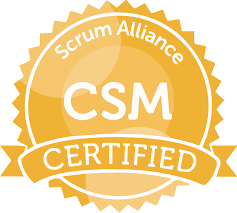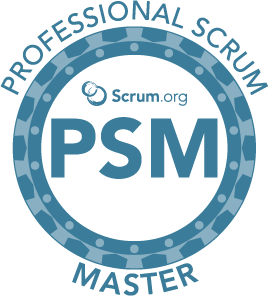
Most IT companies seek to hire candidates who can execute agile and scrum in complicated situations in the contemporary day. Scrum Master certificates are divided into two categories: CSM and PSM I. Reputable regulating bodies offer both PSM I and CSM qualifications. The difference Between CSM and PSM certification is elaborated in this blog.
Are you, like many others, undecided on which certification to pursue? Professional Scrum Master I (PSM I) or Certified Scrum Master (CSM)? To begin, you must first comprehend why you choose to pursue a specific qualification. One of the possible explanations is that you are fascinated by Scrum or wish to pursue the role of Scrum Master in a company. I’ll try to shed some light on both certification courses in this blog. I’ll also try to assist you in deciding which path to take to advance your career.
Let’s have a look at the formal definitions of these two disciplines.
CSM (Certified Scrum Master)

Our Certified ScrumMaster (CSM) training is for you whether you’re ready to adopt agile and deploy Scrum, or if you need the tools to perform Scrum better. During this fundamental course, you’ll learn everything there is to know about Scrum and how to use it to steer your team and company.
PSM I (Professional Scrum Master I)

Anyone who wants to certify their understanding of the Picture Scrum framework and its application can take the Professional Scrum Master level I (PSM I) assessment. Those who pass the exam will receive the PSM I Certification, which recognizes their basic level of Scrum competence.
Let’s have a look at both courses.
Governing Body – Scrum Alliance’s Certified Scrum Master (CSM) Scrum Alliance offers the Certified Scrum Master (CSM) title. Certified Scrum Master is the most popular Scrum certification worldwide.
Process – Professionals must attend live sessions from Agile Waters. Prepare and pass the Certified Scrum Master exam, and claim the credential to become Certified Scrum Master. You will obtain your CSM certification through email. Scrum Alliance will offer you the credential of Certified Scrum Master (CSM) upon successful completion of this Certified Scrum Master training course and passing the exam.
Exam Format – The Multiple Choice Questions will be used in the Certified Scrum Master Exam. Professionals will have 60 minutes (1 hour) to complete 50 multiple-choice questions. A score of 74 percent is required to pass the exam. This means that out of 50 questions, at least 37 must be answered properly.
What’s next after CSM? Advanced certificates such as Advanced Certified Scrum Master Certification (A-CSM) and Certified Scrum Professional – Scrum Master Certification (CSP-SM) are available once you get Certified Scrum Master Certification.
Governing Body – Professional Scrum Master I (PSMTM I) – Scrum.org offers the Professional Scrum Master I (PSM I) designation. The industry-recognized certification course Professional Scrum Master demonstrates the core level of Scrum mastery.
Process – Professional Scrum Master I can take the PSM I assessment right now to become a Professional Scrum Master I. There are, however, courses that can help you prepare for the assessment and develop a better grasp of Scrum. Scrum.org will offer you the designation of Professional Scrum Master (PSM I) if you successfully completed this Professional Scrum Master I certification process.
Exam Format – Multiple Choice, Multiple Answers, and True/False questions will be used in the Professional Scrum Master I Assessment. For 80 questions, the professionals will have 60 minutes (1 hour). They need to get an 85 percent on the exam to pass.
What comes after PSM I? After earning your Professional Scrum Master I certification, you can pursue further certifications such as Professional Scrum Master II (PSM II) and Professional Scrum Master III (PSM III).
Difference between CSM and PSM certification
| Nature | Certified Scrum Master | Professional Scrum Master I |
| Governing Body | Scrum Alliance | Scrum.org |
| Prerequisites | No Prerequisite | No Prerequisite |
| Certification Process | Attend the 16hrs session, get the practical experience and pass the exam | Attend the 16hrs session, get the practical experience and pass the exam |
| Exam Pattern | Multiple Choice Questions | Multiple Choice Questions and True/False |
| Exam Duration | 60 Minutes | 60 Minutes |
| No. of Questions | 50 | 80 |
| Passing Grade | 74% | 85% |
| No. of Attempts | Two attempts (Free) | Two attempts (Free) |
| Certification Validity | 2 Years | Lifetime validity |
| Renewal Required | Yes | No |
| Training Material | Given by the Service Provider | Given by the Governing Body |
| Difficulty Level | Easy | Difficult |
Conclusion
As a result, CSM and PSM I both play a significant role in the contemporary environment, depending on the organizational needs. As a professional, you must stay ahead of the competition by being certified and demonstrating your abilities in a competitive market.








